Solutions
Customer Support
Resources

The risks associated with poor contract management processes are well-documented. Miss a deadline, overlook a clause, or lose track of a key term, and suddenly you’re dealing with costly disputes, wasted hours, and deals that slip through the cracks.
Yet—shockingly—47 per cent of in-house lawyers still use shared drives as a contract “repository.”
No search, no reminders, no visibility. Just bare bones storage. It’s no wonder sales cycles stall, renewals get missed, and legal teams report feeling buried in low-value work.
With contract volumes increasing and business cycles accelerating, manual processes simply can’t keep up. What used to be “good enough” — saving files in folders, chasing signatures over email, or tracking obligations in spreadsheets — is now a liability.
That’s where contract lifecycle management software (CLM) comes in. In this buyer’s guide, we’ll break down what a CLM solution actually is, the features that matter most, how different tools compare, and how to choose the right platform for your team.
Let’s get stuck in.
Contract lifecycle management software is a tool designed to automate and streamline the contract management process for businesses like yours.
These tools make it easier for legal and business teams to create, negotiate, sign, renew, and report on business contracts by automating the manual work traditionally involved in finalising a deal, making a hire, or formalizing a partnership.
Rather than switching between multiple different tools to manage contracts, contract management software enables teams to manage contracts from end to end - all in one platform. This is because all of the features they need are centralized in one workspace.
Most importantly, a contract management solution enables legal to collaborate better with the wider business. Our State of In-house report found that lawyers are 1.5x more likely to feel friction with sales when they don't have a CLM in place.
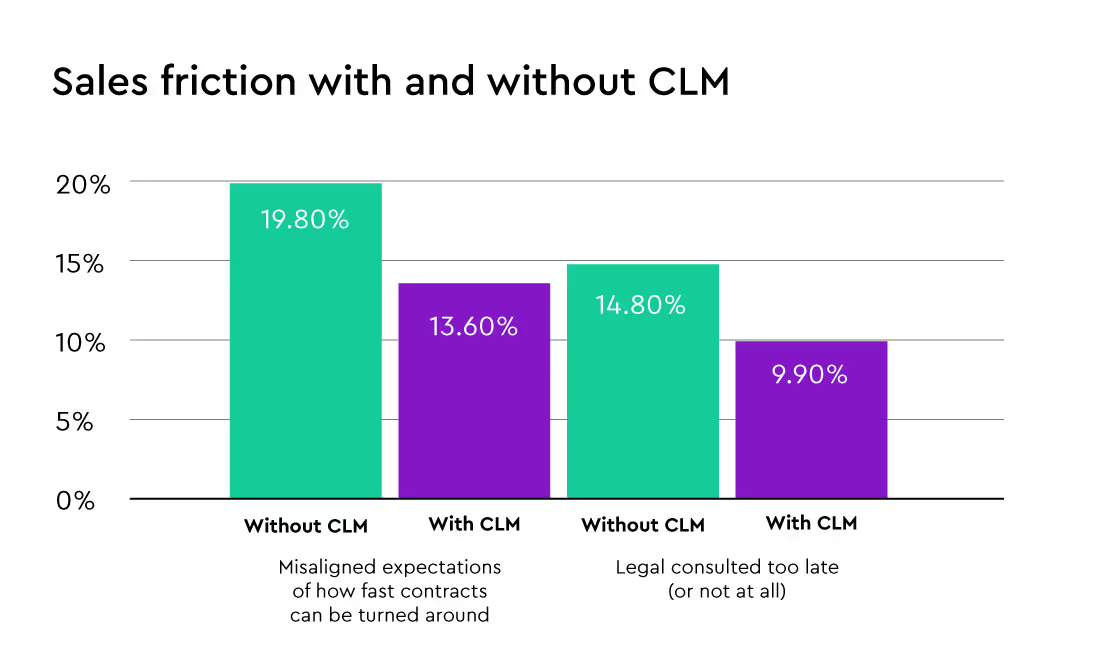
In other words, contract management tools enable legal teams to get out of the way of closing and enable other teams in the business to safely progress contracts.
It’s a common misconception that CLM software is exclusively a gift to legal. And yet, every day, we hear from commercial leaders across organizations benefitting from better contract workflows and automation.
Sales hate bottlenecks — especially when a contract stalls a deal. With CLM, reps can generate contracts directly in their CRM (like Salesforce or HubSpot) using pre-approved templates.
That means no waiting for legal to draft terms. Redlining happens in-browser, signatures are native, and contracts move at the same speed as the deal cycle. Faster contracting = faster revenue recognition.



Hiring at scale generates a mountain of paperwork: offer letters, NDAs, contractor agreements, onboarding docs.
Fortunately, the right CLM automates these repeatable workflows, empowering HR managers to issue contracts in minutes, bulk sign offer letters at scale, and track renewals like visa sponsorships or fixed-term contracts automatically. This delivers a smoother candidate experience and dramatically reduces the admin drag on People & Talent teams.



For finance leaders, contracts are data — not just documents. Having a CLM in place gives them a searchable contract repository with clear visibility into payment terms, renewal dates, and obligations.
Instead of manually reconciling spreadsheets, ops teams can run reports to forecast revenue, spot risks in billing clauses, or flag contracts coming up for renewal. This builds stronger predictability into the business model.



Supplier agreements and vendor contracts generate huge amounts of critical data — from pricing and payment terms to compliance obligations and performance metrics. Without a CLM, this data is often buried in PDFs and spreadsheets, making it hard to monitor.
With a CLM, procurement gains a structured repository that auto-extracts key fields, flags upcoming obligations, and provides dashboards on supplier performance. This makes it easy to track SLAs, spot risks early, and negotiate renewals with data in hand — strengthening both compliance and vendor relationships.



Unlike heavyweight CLM solutions, Juro is specifically designed to work for both legal and commercial teams, meaning faster contract cycles and lower business risk. To find out how Juro can improve legal productivity and enable your teams to self-serve, hit the button below.

Contract AI assistants are among the most transformative contract management software features in 2025, taking what’s possible with contract automation to a new level. With the right legal AI tool, businesses can automate legal processes like contract drafting, review and analysis, getting results in seconds.

This means that teams can create and agree contracts faster than ever before:
A rich-text contract editor is one of the most important features of contract management software. It enables legal teams to pre-define contract templates that business users can use to self-serve on contracts.
Businesses without contract management software will usually rely on Microsoft Word to draft contracts. But there’s no way for legal to control which terms make it into the contracts that commercial teams send out for signing. Instead, contracts quickly become a patchwork of different, often outdated, templates.
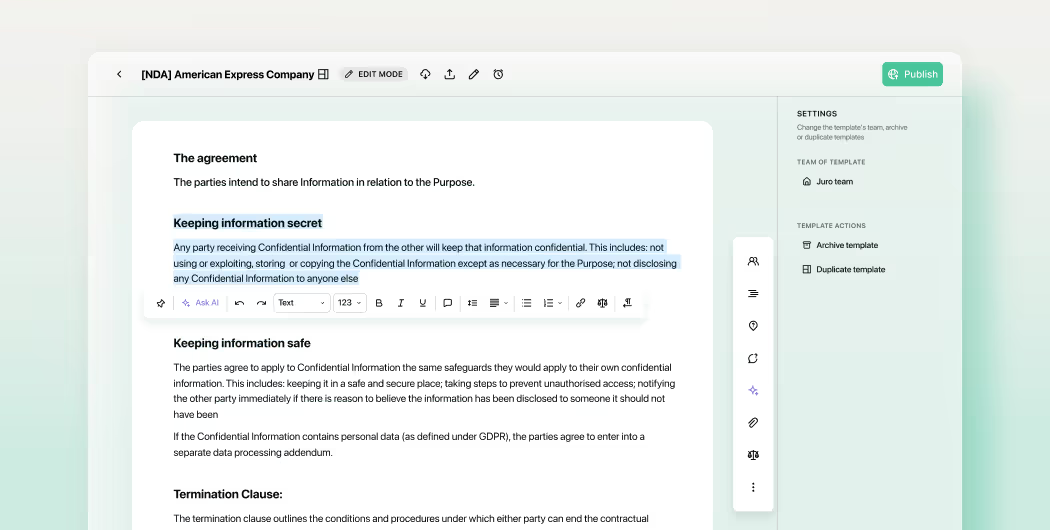
Juro users don’t have this problem. Juro’s contract management software enables legal to control which terms appear in contracts using conditional logic. This enables commercial teams to self-serve confidently on contracts with minimal oversight from legal, and it improves the entire contract management process.
Approval workflows are another useful feature in contract management tools. They enable teams to get contracts reviewed and approved faster without bypassing senior stakeholders.
Without the right tools in place, approvals can become a bottleneck for businesses.
Approval requests sit in a backlog of other tasks. Before you know it, these delays in the sales cycle have resulted in lost revenue. Contracts may even sneak past the approval stage altogether.
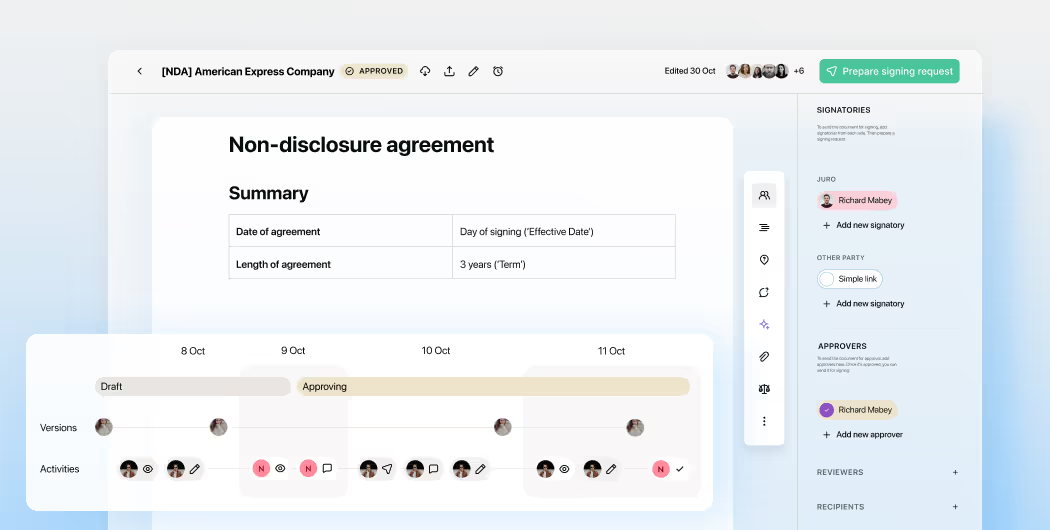
Contract management software removes that risk. Juro’s customizable approval workflows mean that you can be selective about which contracts require approval. You can also send approval reminders to move things along.
Browser-based redlining is one of the most sought-after contract management software features since it enables teams to negotiate contracts in real time.
Without this feature, teams are forced to jump between multiple different tools to negotiate contracts. This process of switching between Word files, emails, and PDFs can slow sales cycles down and make it difficult to track edits.
Contract management software like Juro centralizes contract negotiations, with browser-based redlining, detailed audit trails, and split internal and external versions.

You should also look for contract management software with native eSignature functionality. This enables teams to add legally binding electronic signatures to contracts from anywhere, on any device. Some contract management systems, like Juro, even allow users to mass-sign routine contracts.
In a manual workflow, contracts are signed using wet ink signatures or scanned signatures. Some businesses use a separate eSigning tool like DocuSign or Adobe Sign to sign contracts electronically. But this still means moving between multiple tools just to get contracts over the line.
Choosing contract management software that offers native eSignature removes this friction and makes it possible create and sign contracts in one workspace.

It is also worth choosing contract management software with automated renewal reminders. This feature allows you to track your contracts and manage upcoming deadlines with ease.
Businesses that don’t have a contract management tool usually track their contract data manually in a contract management spreadsheet. This involves extracting and inputting data from individual contracts, which can be a waste of legal’s already stretched time.
All of these deadlines are captured automatically in Juro, so you don’t have to worry about the admin work. You can also set up automated contract reminders so you never miss a renewal deadline again.
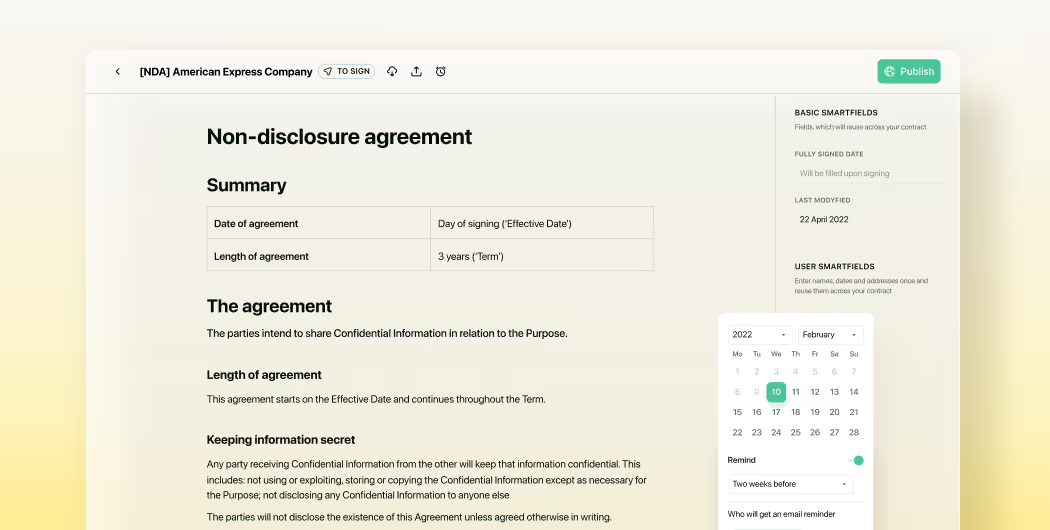
Where you store your contracts matters, particularly as your contract volumes grow. That’s why it’s important to find a contract management platform with a smart storage solution.
In many businesses, contracts are scattered across shared drives. This means they’re difficult to find, hard to monitor, and virtually impossible to report on.
Contract management software like Juro enables you to get more from your contracts post-signature. Not only does Juro let you store your contracts securely, but it also has an analytics feature that enables you to report on contracts and track progress against legal KPIs.
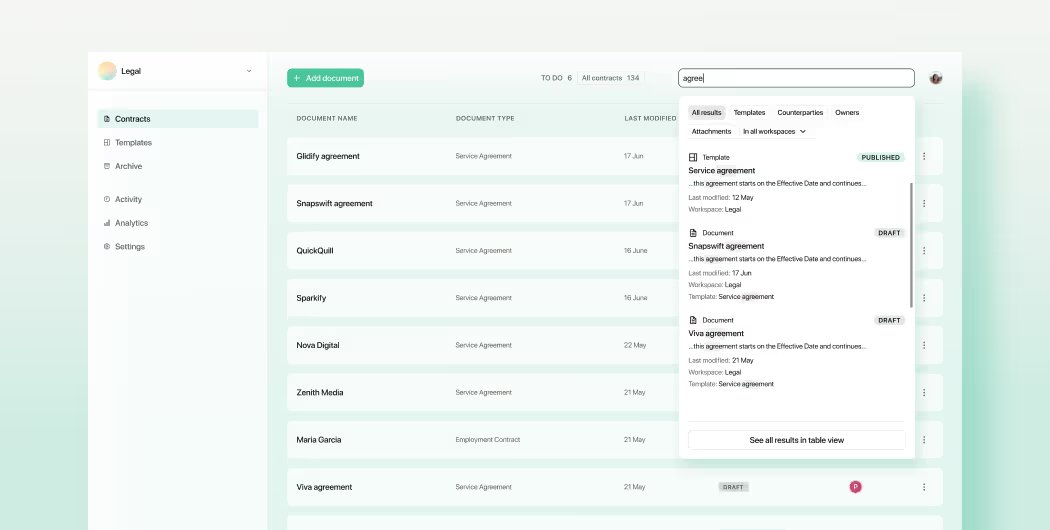
Different CLM vendors cater to different requirements, so there’s no one-size-fits-all solution that beats them all. That said, there are certainly different CLM platforms that outperform others, depending on who’s using it, the scale of your operations, and what you need.
Scaling businesses that want faster contracts without forcing legal to give up control
Top-rated for ease of use, offering clean UI, intuitive for non-legal users
Embedded AI for drafting, review, and automation
Weeks, not months
Less suited for extremely complex global, enterprise setups
Enterprises already using DocuSign eSign wanting to extend to full CLM
Often described as functional but dated
Basic automation, limited generative AI
Months to over a year for large rollouts
Long time-to-value, complex admin
Legal ops teams prioritizing workflow automation and negotiation tracking
More modern than some legacy platforms, but feature-dense and complex
Advanced AI for analytics, redlining, clause insights
Moderate to long
High cost, heavier setup effort
Businesses needing deep customization and compliance workflows
Powerful if well-configured, but not easy to configure yourself
Automation through rules and templates
Long, requires internal admin
Can feel complex or dated in design
Large multinationals with strict governance and regulatory needs
Enterprise-grade but complex, so less suitable for smaller orgs.
Leading AI for risk scoring and contract intelligence
Long, enterprise-level
Expensive, overkill for smaller orgs
Salesforce-driven sales/legal teams linking contracts to revenue ops
Smooth inside Salesforce
Workflow automation and quote-to-cash integration
Medium
Limited value outside sales ecosystem
Legal teams focused on post-signature insights and reporting
Simple and easy to use for post-signature management
AI to analyze and categorize executed contracts
Fast and cloud-based
Lacks full pre-signature CLM features
.svg)
Best for: Scaling businesses that want faster, AI-powered contracting without compromising legal oversight.
Juro is an intelligent contracting platform that embeds AI contract automation in the tools business teams use every day, so they can agree and manage contracts end-to-end - while legal stays in control.
Unlike legacy CLMs, which are expensive, inflexible, and require users from around the business to change how they work, Juro helps you automate routine contract work with AI while enabling the business to self-serve from the tools they already live in.
As a result, Juro sees better adoption business-wide, and commercial teams no longer find themselves up against a stubborn, lengthy legal review process. They agree faster, with less friction, and this results in faster revenue recognition. Every team wins.
.svg)
Best for: Enterprises already using DocuSign eSign that need advanced contract workflows and governance.
Previously known as SpringCM, Docusign CLM is one of the oldest contract management solutions on the market.
Given Docusign’s reputation, the tool is often considered by businesses looking to invest in wider contracting functionality. It offers renewal reminders, approval workflows, and many other features that help to streamline the contract lifecycle.
But it does have some drawbacks.
According to independent reviews on G2 and Capterra, Docusign CLM’s user interface isn’t as intuitive as more modern tools, which can hinder adoption beyond technical legal teams. Similarly, Docusign CLM’s users report long delays in time-to-value. This is because the platform is mostly designed for enterprise-level businesses (unlike its eSigning equivalent), often resulting in a long and costly implementation period.
.svg)
Best for: Legal ops and enterprise teams that need advanced workflow automation and analytics.
Ironclad is one of the most well-known names in modern contract lifecycle management. The platform is built for legal and business teams that need to manage complex workflows, track negotiations, and gain visibility into contract data.
Ironclad’s strengths lie in its automation and analytics features — including AI-powered insights that identify bottlenecks and highlight risk. However, with such depth comes complexity. According to G2 and Gartner reviews, Ironclad’s setup can be time-consuming, and its costs are higher than many mid-market alternatives.
For companies with mature legal ops functions, though, Ironclad’s power and flexibility make it a strong enterprise contender.
.svg)
Best for: Large or regulated organizations needing deep customization and compliance control.
Agiloft is a highly configurable, no-code CLM solution that gives legal and operations teams the freedom to design bespoke workflows, approval hierarchies, and reporting dashboards. It’s especially well-suited for organizations with complex compliance or procurement processes.
The platform’s flexibility is its biggest strength — and also its main challenge. While Agiloft can handle just about any contracting workflow, it often requires a dedicated admin and longer implementation period to get right.
For enterprises prioritizing customization over simplicity, Agiloft is a proven and reliable choice.
.svg)
Best for: Global enterprises managing complex, high-risk contract portfolios.
Icertis is an enterprise-grade CLM solution trusted by some of the world’s largest corporations. The platform emphasizes risk management, compliance, and advanced analytics, using AI to extract insights from huge volumes of contract data.
Icertis offers a robust feature set that supports global contract governance, multilingual templates, and deep integrations with ERP systems like SAP and Microsoft Dynamics. However, that power comes with cost and complexity — deployments can take months, and smaller teams may find the platform overengineered for their needs.
For large, regulated organizations, though, Icertis sets the standard for contract intelligence at scale.
.svg)
Best for: Salesforce-based companies wanting to connect CLM with revenue and CPQ processes.
Conga (formerly Apttus) offers a powerful suite of tools that extend from contract management to quote-to-cash automation. It’s a natural choice for businesses that already run on Salesforce, as its integrations are among the tightest in the market.
Conga CLM helps unify sales, finance, and legal processes, ensuring that commercial terms flow smoothly through the contract lifecycle. However, for teams not embedded in the Salesforce ecosystem, the tool’s complexity and licensing structure can make it less appealing.
For Salesforce-driven businesses, Conga delivers a seamless and revenue-aligned contracting experience.
.svg)
Best for: Legal teams focused on visibility, reporting, and post-signature insights.
Link Squares focuses on the post-signature phase of contract management, giving legal teams powerful visibility into executed agreements. Its AI-driven analytics surface key data points, helping companies understand renewal obligations, risk exposure, and revenue opportunities.
The platform’s intuitive design and fast implementation make it an attractive option for teams looking to improve contract visibility without overhauling their entire CLM process.
That said, Link Squares is lighter on pre-signature functionality like authoring and negotiation. It’s best seen as a complementary analytics platform or a first step toward full CLM maturity.
We hear your frustrations about contract tools in 2025. When we asked 160+ in-house lawyers what frustrates them most about legal tech, they mentioned the following things:
At Juro, we spend a great deal of time thinking about the future of contract management platforms. We have helped our customers process 2 million contracts in over 85 countries, and we're proud to have helped them, and many more, collectively save millions of hours on low-value work.
Intelligent contract management software like ours will shift legal teams from being front-end users of CLM to back-end enablers. Instead of manually reviewing and approving every contract, lawyers will set playbooks and guardrails that allow business teams to self-serve on contract tasks.



AI-native CLMs will not only automate workflows but also learn from contract data, streamlining negotiation and execution. Contracts will be deeply embedded in existing tools—imagine a sales rep generating, negotiating, and signing a contract entirely within Salesforce. Or a hiring manager requesting a new employment contract in Slack and receiving a draft instantly.
To stay ahead, businesses need a CLM that doesn’t just digitize contracts but transforms them into intelligent, automated workflows—accelerating deal cycles, reducing legal bottlenecks, and embedding contracts where work actually happens.
That's what our customers are getting at Juro, and you can join them.
